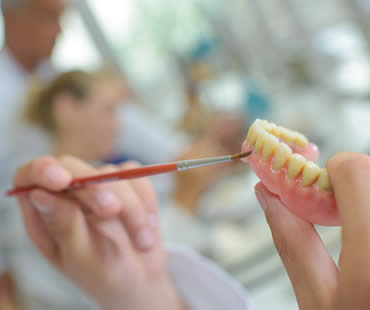
by Dr. Adkins | Jul 26, 2019 | Blog, Dental Topics 2, Teeth Whitening
Simple pleasures like enjoying a cup of coffee or sipping red wine can stain your teeth and leave you with a yellowed smile. Instead of giving up some of your favorite pastimes, you can restore your smile with professional teeth whitening. Home whitening options are available, but to achieve the fastest and most dramatic improvements, professional whitening methods are the way to go.
Teeth whitening is a quick and safe procedure, making it the most popular cosmetic dental procedure today. Some patients even have it done during their lunch break and go right back to work. It’s that easy! The process typically involves protecting your gums from becoming sensitive during treatment, and then applying a whitening solution to your teeth. The solution stays in place for a specific length of time and often a special ultraviolet light is shined on them to enhance the whitening process. Then your teeth are rinsed. The process might be repeated in some areas with severe stains, but the dental professional is careful not to over-whiten your teeth or cause discomfort.
You can choose the shade of white that you would like your teeth to be, and your cosmetic dentist will help you make the best choice. The goal should be to look natural and complement your skin tone. Since teeth whitening is a safe process, just about everyone is a candidate unless you have severely poor oral health. It is usually painless, although those with extremely sensitive teeth may have some discomfort that should dissipate shortly after treatment.
Rejuvenating your smile with teeth whitening is a simple way to make you look younger and enhance your smile. It also improves your self-esteem by giving you confidence in your appearance. A bright, white smile can be yours today through professional teeth whitening.
Schedule your appointment at our McDonough dental office

by Dr. Adkins | Jul 19, 2019 | Blog, Dental Topics 2, Dentures
Thanks to advances in dental technology, dentures are more natural looking and comfortable than ever before. If you are one of the many adults wearing dentures to replace missing teeth, there are several do’s and don’ts you will want to follow to ensure they maintain their fit and your oral health:
- Do take your dentures out before going to bed, allowing your mouth tissues to rest from wearing them all day.
- Don’t let your dentures dry out. Soak them in mild denture solution or water while you sleep.
- Do clean them daily with either a mild detergent or special denture cleaning solution and a soft-bristled brush.
- Don’t soak them in very hot water, as this could cause them to warp, and they will no longer fit properly.
- Do handle them with care. Dropping your dentures or treating them with strong cleansers or harsh brushes can do permanent damage.
- Don’t neglect your oral care for the rest of your mouth. Even patients with a full set of dentures need to take care of their gums, and if you have partial dentures you should continue to brush and floss your remaining teeth regularly.
- Do pay attention to changes in the fit or feel of your dentures. Problems with fit can lead to irritation and discomfort, and could also be an indication of gum disease.
- Don’t try to adjust or repair your dentures on your own. If your dentures are ill-fitting or damaged in any way, schedule an appointment with your dentist to have them evaluated.
- Do continue to see your dentist for regular checkups to help maintain your best oral health and check your dentures for fit and function.
If you are missing all or some of your teeth, dentures can greatly improve both your appearance and the quality of your life. By following these simple guidelines, you can maintain the beauty and functionality of your dentures for many years.
We look forward to seeing you in our McDonough dental office

by Dr. Adkins | Jul 5, 2019 | Blog, Dental Topics 2, Oral Surgery
If you or a loved one is scheduled to have or has recently had oral surgery, you probably have a lot of questions. Here are some of the most common questions:
- One of my stitches came out after my surgery, should I be worried? Losing a stitch isn’t a problem. In the majority of cases, stitches are put in place during surgery to assist in clot formation and bleeding control. If you have undergone a bone-graft procedure, however, contact your surgeon because you may need to be seen immediately.
- What can I eat after surgery? Immediately following surgery, eat only soft foods of tepid temperature. Avoid very hot or very cold foods. Eat nothing that is crunchy or chewy so you won’t damage the surgical site.
- I am having a lot of pain following my procedure, what should I do? If you have been prescribed pain medication, take it as recommended. If no prescription was given, use over-the-counter medicines containing natural anti-inflammatory properties such as ibuprofen. Stay hydrated by drinking room temperature water and get plenty of rest.
- I had a tooth extracted, how can I tell if I have a dry socket? Dry socket is the result of the loss of the blood clot present in the extraction site. Smoking, using a straw, poor oral hygiene or failure to rest properly following the extraction procedure can lead to this condition. Typically dry socket will present within one week of extraction and is treated with sterile wash and pain-relieving, medicated gauze.
- I had a procedure this morning and am still bleeding. Is that normal? Bleeding following extractions or other surgical procedures is common. If you are bleeding more than normal, bite down on some sterile gauze or a damp teabag for twenty or thirty minutes. Don’t keep removing the gauze to look for blood; that can make the bleeding worse. Call your surgeon if you feel your bleeding is excessive.
Your oral surgeon can answer these questions and more. Don’t hesitate to call the surgeon’s office to get the peace of mind you require to heal comfortably following your procedure.
We look forward to seeing you in our McDonough dental office

by Dr. Adkins | Jun 28, 2019 | Blog, Dental Topics 2, Root Canal Treatment
If you are dealing with ongoing tooth pain, you may be too fearful to go to the dentist to find out what’s going on. It’s important that you do, however, as you may need root canal therapy. Your dentist will need to evaluate you to see if that procedure is necessary, and will closely examine several factors: the signs the dentist can see personally, the results of any tests performed during your visit, and the symptoms you have been experiencing with the problematic tooth.
Your dentist may observe:
- A tooth that is discolored
- X-rays that reveal a tooth problem
- A fistulous tract, or persistent or recurring gum pimple
Additional testing done by your dentist:
- X-rays provide an extremely clear picture of the health of the tooth
- Thermal testing can evaluate sensitivity through a careful application of hot or cold temperatures
- Percussion testing evaluates pain response through gentle tapping
You may have been noticing:
- A broken or cracked tooth obviously decayed or damaged
- A discolored tooth, especially a grey tooth
- A “bubble” in your gums, like a pimple. It may or may not have ruptured, leaking pus that smells or tastes awful
- Pain that shoots out from one tooth to your jaw or ear, leading to earache symptoms
- Pain that prevents you from living your life without painkillers
- Pain, sensitivity or swelling on one certain tooth
- Extreme sensitivity to hot or cold liquids that lingers and is very painful
In some cases, an infected tooth that requires a root canal treatment has no symptoms at all that could be discerned by you. Only a dental professional can confirm the need to undergo root canal therapies. If you are experiencing pain that disrupts your life, talk to your dentist or endodontist immediately. Root canal treatments are designed to relieve the pain you’re experiencing now and to restore your tooth to full form and function. Don’t wait to get your life and smile back!
Our dental office is located in McDonough

by Dr. Adkins | Jun 21, 2019 | Blog, Dental Information, Dental Topics 2
Reaching for a sports drink may seem like a smart way to rehydrate during a big game or after completing your exercise regimen, but you may not be as educated as you think. Consumption of sports drinks is on the rise, with 62 percent of American teenagers drinking at least one a day. That’s why it’s important to inform consumers that these drinks which are touted to help your body can also take a toll on your health, at least on your oral health. Let’s find out exactly how sports drinks can negatively impact your teeth.
What makes sports drinks harmful?
You might guess that sugar is what makes these drinks less appealing. It’s true that you should avoid the brands heavy in sugar, but that’s actually not your teeth’s biggest enemy in sports drinks. It’s the high acid content that presents the most danger. Researchers have found that sports drinks have so much acid that they can start damaging your teeth after just five days of regular consumption.
Aren’t they better than drinking soda?
Most people choose these drinks thinking they will enhance their sports performance, and that they’re a better option than soda. Sports drinks are not that different than soda because they contain as much or more sugar. It’s simply not true that sports drinks are healthier for your teeth than soda.
What kind of damage can they do?
The acid in sports drinks can cause irreversible damage to your teeth. They erode your enamel, which is the shiny outer layer of your teeth, causing them to become sensitive to temperature changes and to touch. It also increases your risk of decay and cavities.
How can I avoid harming my teeth?
If you just can’t give up sports drinks, at least try to minimize the amount you consume. Rinse your mouth with water afterwards, but don’t brush your teeth immediately because it might spread the acid around your mouth. Wait about an hour for the pH level in your mouth to normalize, and then brush. You can also chew sugarless gum after having a sports drink, which increases your saliva flow and helps to return your mouth’s acidity levels back to normal.
We look forward to seeing you in our McDonough dental office

by Dr. Adkins | Jun 14, 2019 | Blog, Dental Topics 2, Root Canal Treatment
If you suspect you have an infected tooth, you might wonder if root canal treatment might be in your future. Do you have another option? Yes! One such alternative has been in existence for decades, but has only recently come to be more effective due to advancements in materials. This process is called pulp capping.
Pulp capping can help patients whose root infections have not yet reached the tooth’s nerve. Root infections begin when bacteria enters the pulp of the tooth through a crack or a large cavity. In a standard root canal procedure, the pulp and nerve of the tooth is hollowed out, cleaned and sealed, typically with a crown restoration.
With pulp capping, the nerve is preserved and the tooth is often repaired with a filling instead of a crown. Pulp capping allows the dentist to clean and protect the pulp, defending it from infection with medicine. With a successful pulp cap, the dentin of the tooth begins to regrow over the pulp cap. Advancements in the sealants used during these types of procedures has allowed for a greater percentage of success.
If you have a toothache, it’s important to see your dentist immediately. Pulp capping has a narrow window in which it can be performed. If your tooth is too infected, the pulp and nerve of your tooth may already be infected, and it’s too late for pulp capping to be effective.
A pulp cap is a far less invasive procedure than a root canal treatment or a tooth extraction, and there is less recovery time and tooth sensitivity following the treatment.
If you suspect you may have a tooth in trouble, talk to your dentist now. You might be able to save yourself a root canal treatment.
Our dental office is located in McDonough








 (470) 665-5292
(470) 665-5292  E-Mail Us
E-Mail Us 
